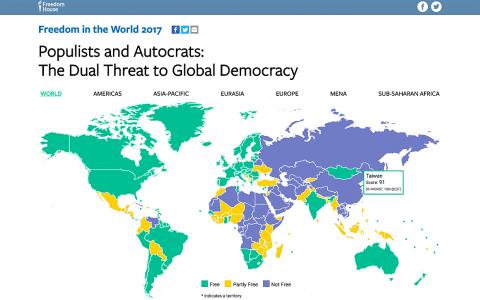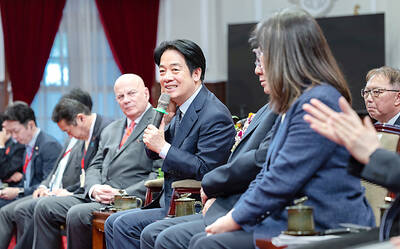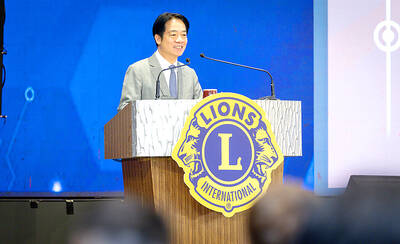Taiwan has been rated ahead of the US in Freedom House’s latest Freedom in the World report.
In the annual report released by the Washington-based rights watchdog on Tuesday, Taiwan scored 91 out of 100, beating out France (90), the US (89) and South Korea (82).
Taiwan was given a perfect score — one out of seven, with one representing the most free and seven the least free — in both political rights and civil liberties, as well as receiving one for overall freedom.

Photo: Screenshot from the Freedom House Web Site
The last time Taiwan scored the highest freedom rating was in 2006. Since then, its annual freedom rating had been 1.5.
Last year, Taiwan was rated one for political rights and two for civil liberties.
Freedom House attributed Taiwan’s improved civil liberties to its “demonstrations of media independence and academic freedom in recent years, including in media coverage of the 2016 elections.”
The report said that while the US elections demonstrated “the continued openness and dynamism of the American system,” they also showed that the US is not immune to populist appeals that are being seen across the Atlantic.
The report said that the global rise of populism — namely the UK’s Brexit vote, the US election results and the rising popularity of xenophobic political parties in the EU — marked last year as the 11th consecutive year of decline in global freedom.
Even countries that were previously rated “free” by the report suffered setbacks in political rights, civil liberties or both, including Brazil, the Czech Republic, Denmark, France, Hungary, Poland, Serbia, South Africa, South Korea, Spain, Tunisia and the US.
Of the world’s 195 nations, 87 (45 percent), were rated free; 59 (30 percent), were rated partly free and 49 (25 percent), were rated not free.
In the Asia-Pacific region, Cambodia, Laos, Vietnam, Thailand and China were all considered “not free,” scoring 31, 12, 20, 32 and 15 respectively.
The report said China received a low ranking because of “the chilling effect on private and public discussion, particularly online, generated by cybersecurity and foreign non-governmental organization laws, increased Internet surveillance and heavy sentences handed down to human rights lawyers, microbloggers, grassroots activists and religious believers.”
The state of freedom is evaluated by assigning points from zero to four on a series of 25 indicators for an aggregate score of up to 100.
These scores determine political rights and civil liberties ratings on a scale of one to seven. A nation or territory’s political rights and civil liberties ratings then determine whether it has an overall status of free, partly free or not free.
The Presidential Office yesterday said that the improvement in Taiwan’s freedom rating serves as proof that the nation’s long-term efforts in pursuing progressive values such as democracy, freedom and human rights have earned the recognition of the international community.
“We will continue to adhere to these values and deepen the nation’s democracy in the future, as part of our efforts to contribute to the stability and prosperity of the Asia-Pacific region,” the office said.
Additional reporting by Stacy Hsu

Two US House of Representatives committees yesterday condemned China’s attempt to orchestrate a crash involving Vice President Hsiao Bi-khim’s (蕭美琴) car when she visited the Czech Republic last year as vice president-elect. Czech local media in March last year reported that a Chinese diplomat had run a red light while following Hsiao’s car from the airport, and Czech intelligence last week told local media that Chinese diplomats and agents had also planned to stage a demonstrative car collision. Hsiao on Saturday shared a Reuters news report on the incident through her account on social media platform X and wrote: “I

‘BUILDING PARTNERSHIPS’: The US military’s aim is to continue to make any potential Chinese invasion more difficult than it already is, US General Ronald Clark said The likelihood of China invading Taiwan without contest is “very, very small” because the Taiwan Strait is under constant surveillance by multiple countries, a US general has said. General Ronald Clark, commanding officer of US Army Pacific (USARPAC), the US Army’s largest service component command, made the remarks during a dialogue hosted on Friday by Washington-based think tank the Center for Strategic and International Studies. Asked by the event host what the Chinese military has learned from its US counterpart over the years, Clark said that the first lesson is that the skill and will of US service members are “unmatched.” The second

STANDING TOGETHER: Amid China’s increasingly aggressive activities, nations must join forces in detecting and dealing with incursions, a Taiwanese official said Two senior Philippine officials and one former official yesterday attended the Taiwan International Ocean Forum in Taipei, the first high-level visit since the Philippines in April lifted a ban on such travel to Taiwan. The Ocean Affairs Council hosted the two-day event at the National Taiwan University Hospital International Convention Center. Philippine Navy spokesman Rear Admiral Roy Vincent Trinidad, Coast Guard spokesman Grand Commodore Jay Tarriela and former Philippine Presidential Communications Office assistant secretary Michel del Rosario participated in the forum. More than 100 officials, experts and entrepreneurs from 15 nations participated in the forum, which included discussions on countering China’s hybrid warfare

MORE DEMOCRACY: The only solution to Taiwan’s current democratic issues involves more democracy, including Constitutional Court rulings and citizens exercising their civil rights , Lai said The People’s Republic of China (PRC) is not the “motherland” of the Republic of China (ROC) and has never owned Taiwan, President William Lai (賴清德) said yesterday. The speech was the third in a series of 10 that Lai is scheduled to deliver across Taiwan. Taiwan is facing external threats from China, Lai said at a Lions Clubs International banquet in Hsinchu. For example, on June 21 the army detected 12 Chinese aircraft, eight of which entered Taiwanese waters, as well as six Chinese warships that remained in the waters around Taiwan, he said. Beyond military and political intimidation, Taiwan